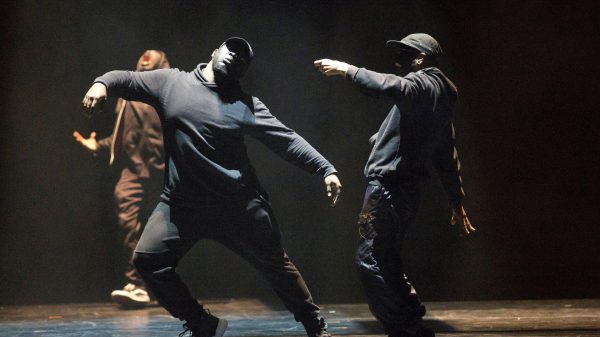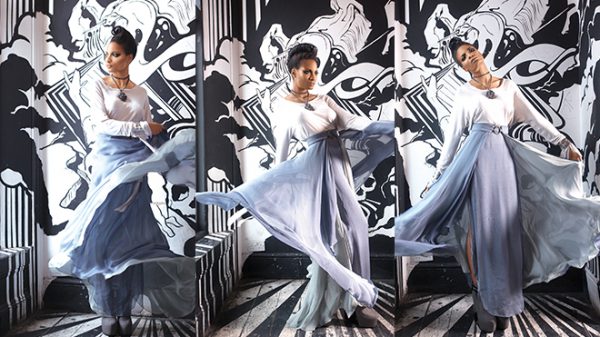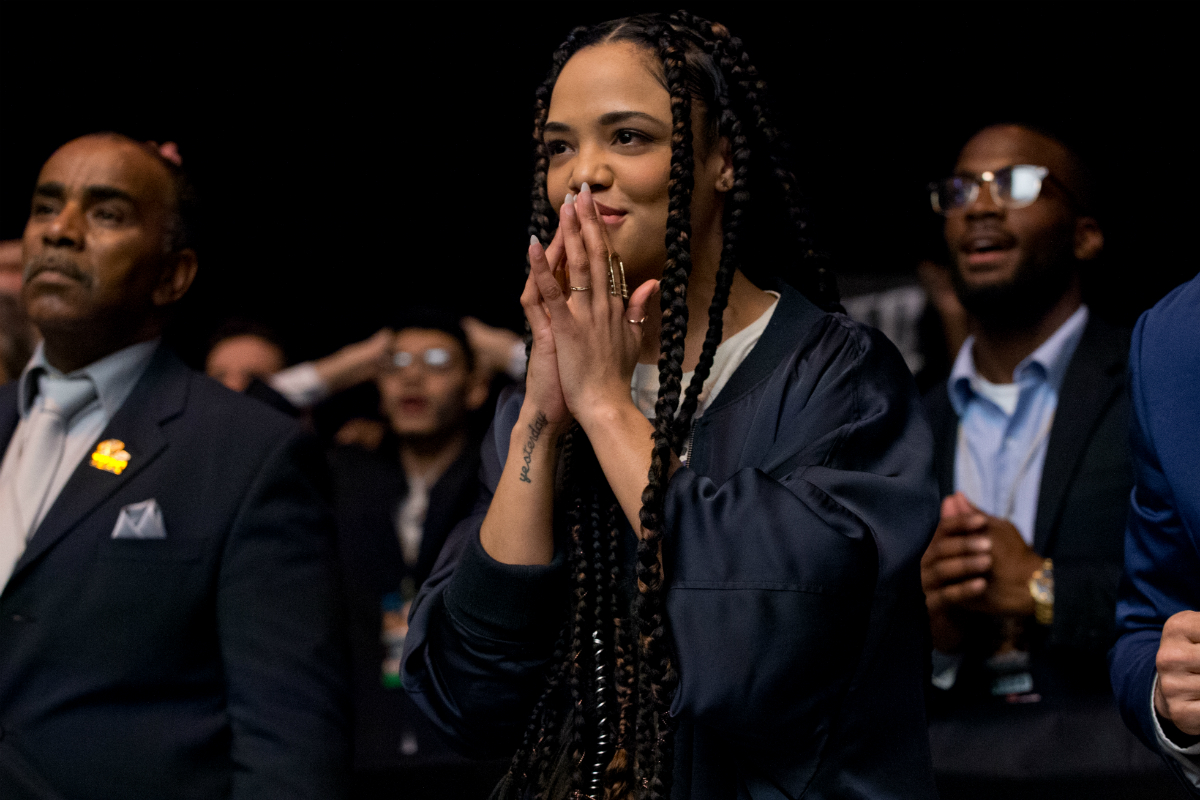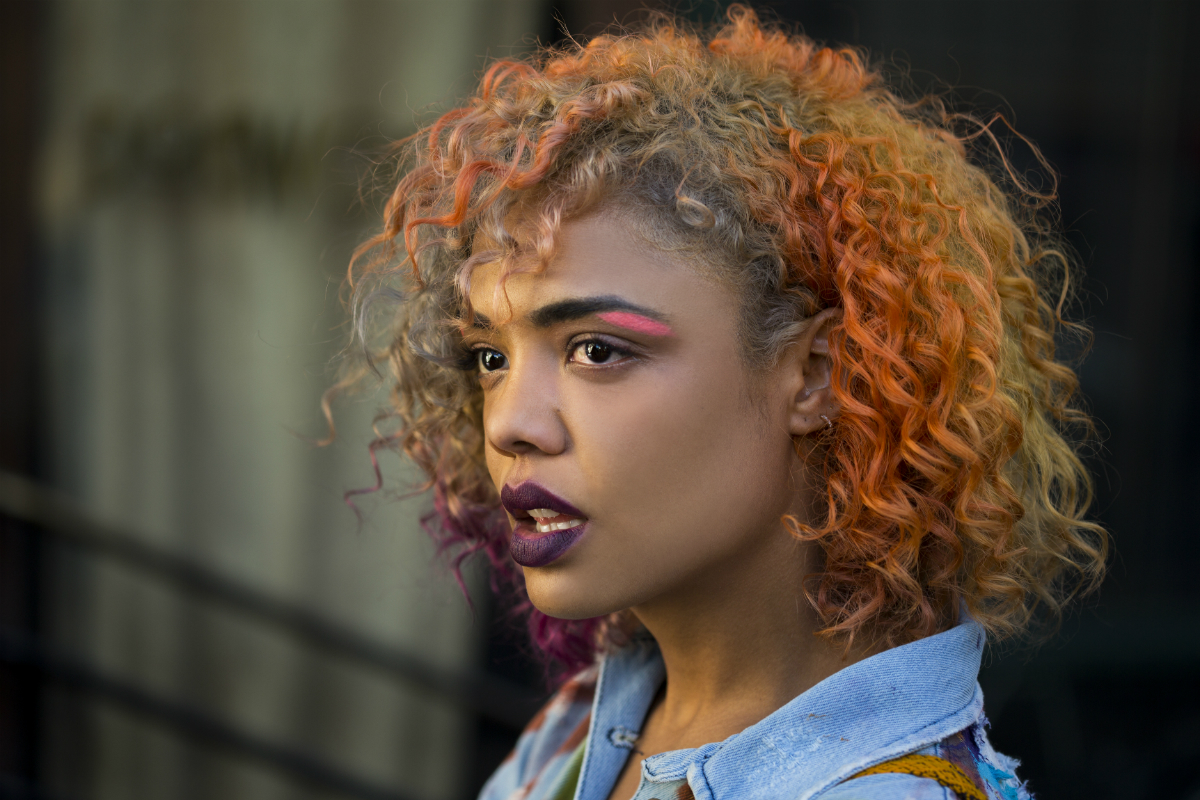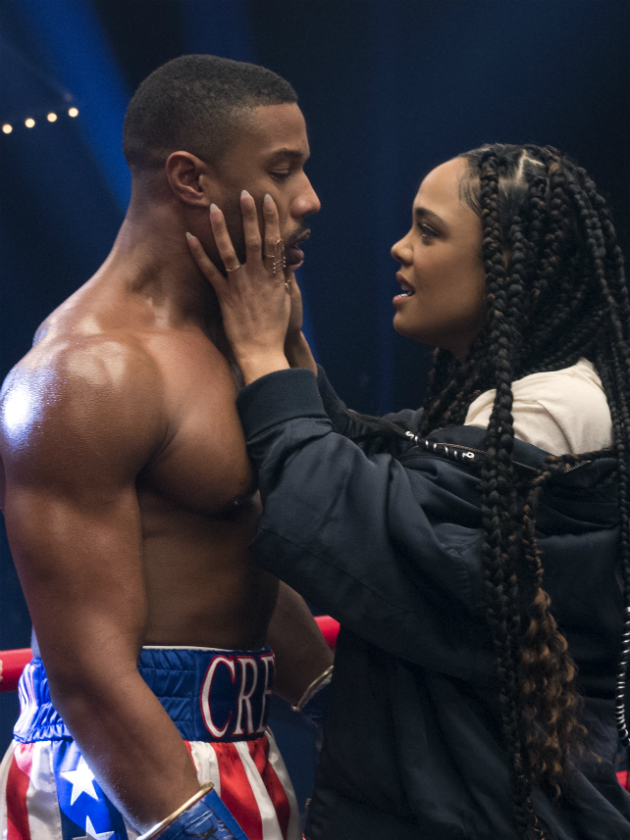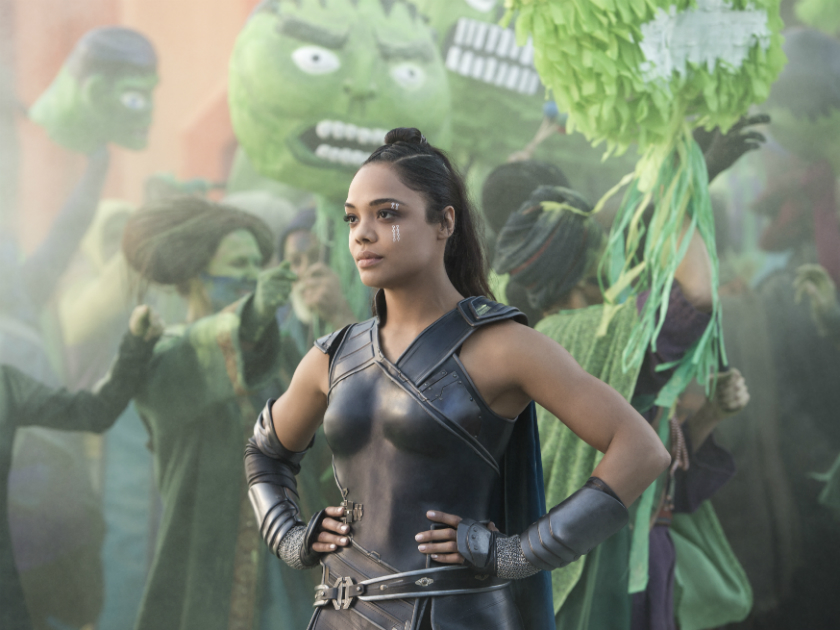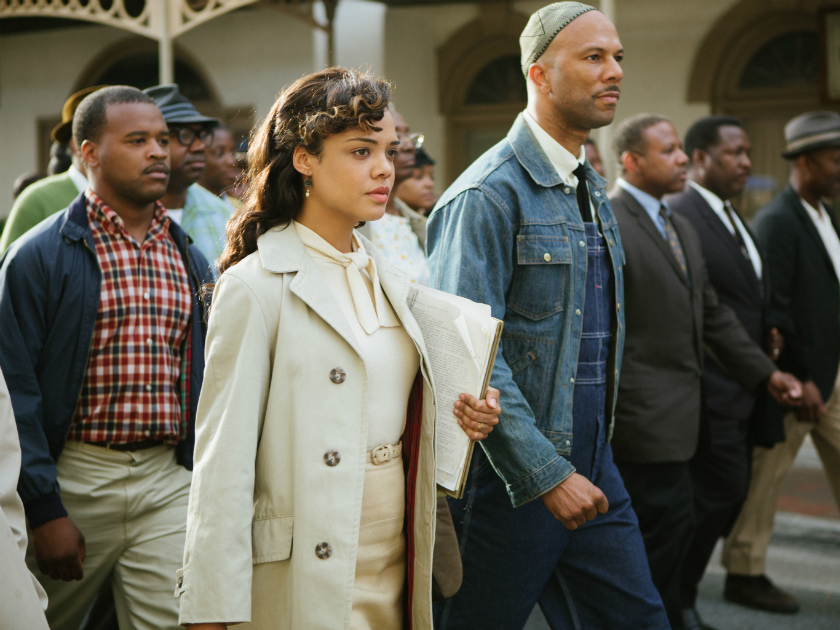The actress opens up on filming Creed II with Michael B Jordan, her diverse range of roles, and recent speculation on her sexuality
When put into perspective, there are only a small number of Hollywood actors that eventually grow to become household names, recognisable worldwide for their bundles of talent. Sadly, a smaller percentage of these stars are black actors. If Tessa Thompson isn’t there for you now, it’d be wise to get to know her as soon as possible; as she’s well on her way to becoming one of the next names secured in your mental screen catalogue.
Whether it’s from her role as the director of the virtual reality theme-park universe in sci-fi series Westworld, or as a quirky visual artist in indie dystopian comedy Sorry To Bother You, Tessa Thompson often finds herself in roles that instantly attract the audience’s attention, and leave the audience eager to know more.
The Los Angeles and Brooklyn-raised actress has been putting in hard work, and strong, sensitive performances throughout her career, even in smaller roles in shows such as Veronica Mars, Cold Case and Grey’s Anatomy in the mid-2000s. Her leading role in Dear White People in 2014 introduced her to another audience, as she played a biracial student activist in a predominantly black university, navigating growing racial tensions on campus. As time has progressed, Tessa Thompson has established herself as a character chameleon – so it’s a wonder how she goes about selecting which role to take on next. For Thompson, it’s all about the challenge.
‘I really like to do things that scare me in some way,’ she says in our chat. ‘It’s a barometer for me, in terms of picking projects. I love the feeling of getting a role and then wondering if I can do it.’
One of the roles many may recognise her from best is her character in boxing blockbuster franchise, Creed. As an spinoff, and sequel of the Rocky franchise, it had a lot to prove when it first hit cinemas in 2015. However, recentring the story around Apollo Creed’s love child, Adonis Creed – played by Michael B. Jordan – was received incredibly well, with critics praising the fresh, but familiar story content, as well as the compelling performances of Jordan, Sylvester Stallone (who reprises his role as Rocky Balboa) and Thompson.
In the first film, she’s introduced to us as scrappy singer-songwriter Bianca Taylor, who is Adonis’ neighbour and eventual love interest. Though there’s a genuine warmth to her, Bianca has her guard up – partially from having strained relationship with family, and partially due to having progressive hearing loss. As well as being a refreshing depiction of life with a hearing disability and its nuances, Bianca is independent and engaging enough that her existence in the film is far from being a mere romantic subplot.
In the thrilling sequel, Creed II, both Adonis and Bianca are more seasoned; with progress in their careers and deeper grounding in their relationship, it’s clear to see they’ve grown up in their time since Creed. According to Thompson, it’s a case of life imitating art: ‘Both Mike and I have matured since we made the first film about four or five years ago – and it’s the first time that either of us have come back to play a role and reprise that role on film.’
Some trivia: Thompson actually co-wrote Bianca’s songs herself – and it ended up being key to getting back in character for a second time. ‘Much like the first film, the work of Bianca starts with making the music – so I started there again,’ she says. ‘When I talk about liking to find something that challenges me, that was the thing that was sort of daunting about Bianca: creating this music, especially the first time around, because I’d never done something like that.’
Though music is a clear passion of hers, when I ask if she’d be looking to release music of her own, she’s hesitant – though it allows her to utilise a completely different creative muscle, it’s the film industry that has her attention right now. Though, if she did, she’d take a leaf out of Donald Glover’s book of career duality: ‘I really enjoyed having the separation. I wrote these songs, and they were a little bit personal to me, so I can see why someone like Donald Glover has the separation; the Childish Gambino [persona]. I’d probably want to take the same approach; a persona that feels separate from me.’
With the acting jobs rolling in thick and fast, can you really blame her for sticking to what’s working? From portraying civil rights activist Diane Nash in Ava DuVernay’s 2015 historical drama Selma, to Norse mythical figure Valkyrie in crowd-pleasing Marvel film Thor: Ragnarok, even to her upcoming role in Passing, adapted from Nella Larsen’s 1929 novella about black people ‘passing’ for white in Renaissance New York – there’s no real way to tell what Tessa Thompson will do next. While it feels as if slowly, but surely, the film industry is becoming more exciting in the characters it allows for women of colour, Thompson has been able to show versatility all throughout her career.
In Thompson’s view, her ability to avoid the stereotyping that seems to befall a number of black actresses, especially in the early stages of their careers, is the result of good fortune, good timing (‘there’s so many women who paved the way for me to be here and they didn’t get to enjoy as much diversity in the roles that they got to play’), and a conviction to only play roles that really stimulated, and intrigued her – even if it meant not working as often.
‘I had a real hesitation to playing things that felt stereotypical, or playing roles where the woman was a cipher, or boxed into a space too much because of gender or race,’ she admits. ‘I think I just felt comfortable in frankly not working as much, if it meant that I didn’t have to do things that made me cringe inside!
‘I feel a part of not being boxed into a space is being like, “Okay, I just won’t play the game in the same way; I’ll wait until the game is more interesting.” I think I’ve been able to do that, and to get to work with filmmakers that are interested in pushing those boundaries that have an expansive idea about what a young woman of colour can be.’
At the time of our phone call, the US was in the early aftermath of the midterm elections. With plenty of celebrities having urged their followers to pay close attention, to take a stand and to have a say in the way their country is being run, Thompson was definitely one doing her part in helping bring awareness to the importance of using your vote.
‘For so long, that idea [of publicly discussing politics] was sort of taboo; that you just don’t do that in mixed company. I think that the time you do is in mixed company. That’s when it’s most exciting and fruitful and productive: when we figure it all out together.’
This sense of collaborative spirit translates into her involvement in the Time’s Up initiative – a movement founded by Hollywood celebrities on 1st January 2018, standing against sexual harassment across all industries. She has been one of the most prominent faces doing the work, and is unafraid to criticise fellow celebrities for misrepresenting how connected they are to the cause. (In January, she publicly called Lena Dunham out for not attending planning meetings.)
But an unexpected way that she hit headlines this year relates more to her personal life, rather than her political, or professional purusits – as the nature of her relationship with popstar Janelle Monáe has been hotly discussed. As well as appearing close in public, Thompson features prominently in the singer’s ‘emotion picture’, Dirty Computer – particularly in the music video for ‘Pynk’, in which scenes show Thompson’s head in-between Monáe’s legs, which are themselves adorned in pink, flared trousers, symbolic of a vagina. Suggestive stuff, at the very least.
While Monáe has revealed that she identifies as pansexual (not limited in sexual choice with regard to biological sex, gender, or gender identity), Thompson has also given more insight into her sexuality in recent months. In a June 2018 interview with Net-A-Porter, Thompson said that she is attracted to women, as well as men, while asserting that she and Monáe ‘love each other deeply… We’re so close, we vibrate on the same frequency. If people want to speculate about what we are, that’s okay. It doesn’t bother me.’
While the actual words of her declaration don’t give definite answers on her sexual identity, nor the nature of their connection, the media and the internet at large ran with her statements, concluding that Tessa Thompson is bisexual and in a romantic relationship with Janelle Monáe. Thompson didn’t hesitate to remind people of the exact words she used, and to this day asserts that while she didn’t intend for her speaking her truth to have caused such a stir, she doesn’t put a definite label on her sexuality.
‘It certainly was unintentional for me; I was just sort of speaking candidly,’ she explains. ‘For me, you say one thing to a journalist and then it gets spun all sorts of ways. For me, I don’t think in terms of the binaries that some folks do, so “bisexual” is a word that I didn’t actually use when I was talking about my own personal experience.
She goes on to be relieved when I ask her about her ‘queer’ identity, rather than a ‘bisexual’ identity: ‘I appreciate you saying ‘queer’, because it means that you really read [the interview]!’ she laughs. ‘I feel like, unfortunately, so many people don’t [read], or we live inside of a clickbait culture. Whatever; I don’t think in terms of those binaries, but I feel excited to be living in a time where I’m unpacking my own stuff around gender and identity.’
Despite the media half-truths, she admits that the response since speaking out has been ‘cool’; as a black woman, of Afro-Panamanian and European-Mexican descent, she’s been an exciting figure for black and Latinx people on the LGBTQ spectrum to look up to. ‘People write things to me on social media, they’ve come up to me in the street; certainly people have spoken about how, in some way, I’ve helped them come out, or have conversations that they hadn’t had before.’
A bright light on-camera and off, Tessa Thompson’s persistence to work, and live with integrity is something completely admirable. With projects already in place to keep her working well through 2019, it’s only a matter of time before she gets the due appreciation she’s been working for.
Creed II is in cinemas nationwide now






